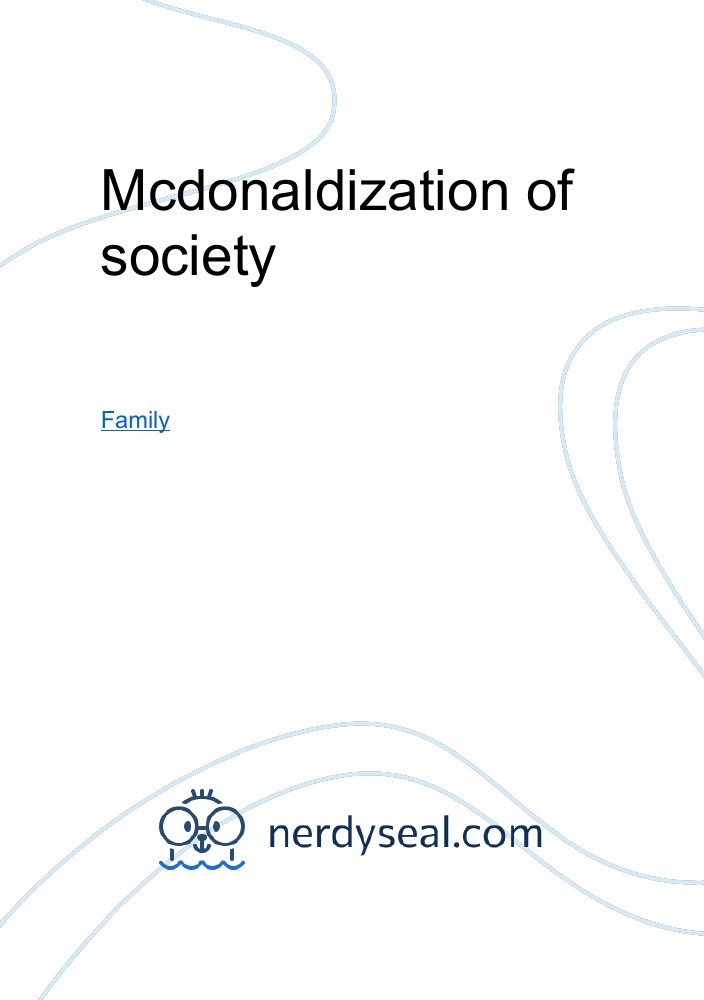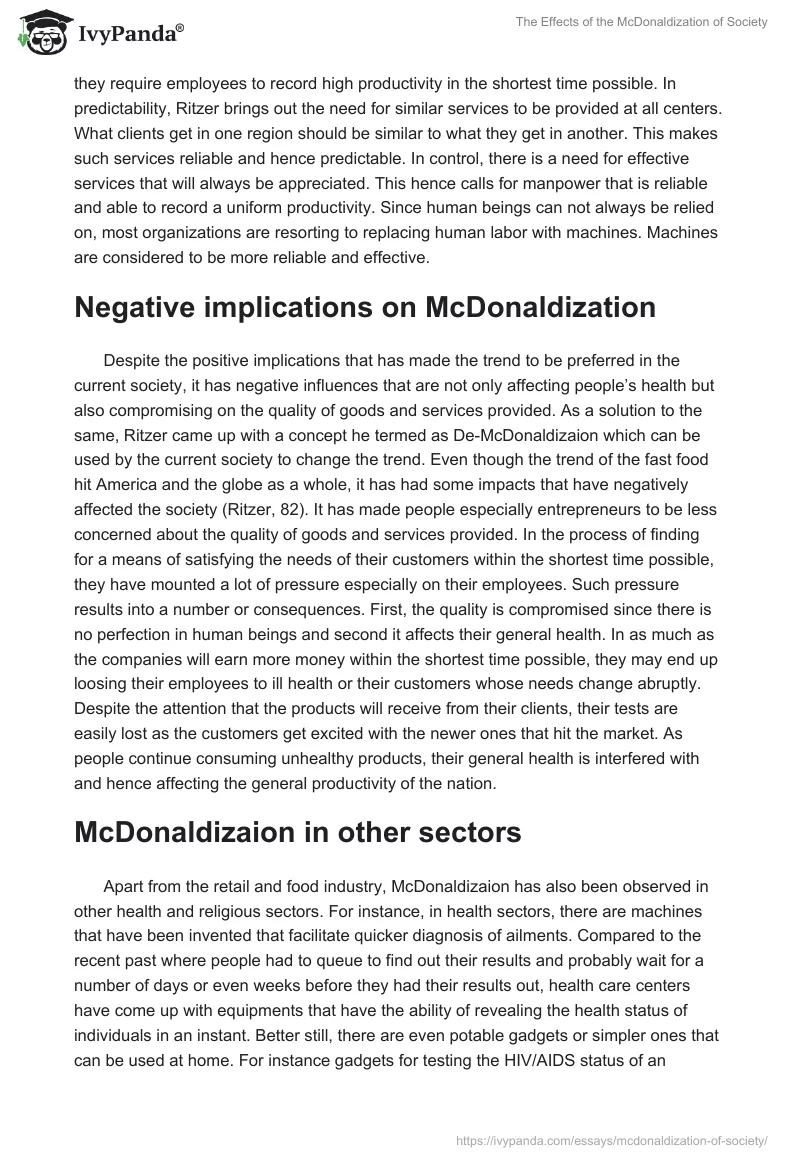Have you ever noticed how so many things in our lives seem to be increasingly standardized, efficient, and predictable? From fast food restaurants to online shopping, a pervasive sense of uniformity and routine permeates our daily experiences. This phenomenon, known as “McDonaldization,” reflects a broader societal shift towards rationalization and control– a shift that has profound implications for our individual lives and the collective fabric of society.

Image: nerdyseal.com
Coined by sociologist George Ritzer in his 1993 book, “The McDonaldization of Society,” the term describes the process by which the principles of the fast-food restaurant are applied to an ever-wider range of social spheres. Understanding McDonaldization helps us grasp how efficiency and predictability, while seemingly beneficial, can potentially stifle creativity, innovation, and human connection. This article delves into the core principles of McDonaldization, explores its impact on various facets of our lives, and examines the potential consequences of this seemingly unstoppable force.
The Four Pillars of McDonaldization
At its core, McDonaldization embodies four key principles:
1. Efficiency: The Quest for Speed and Productivity
The relentless pursuit of efficiency lies at the heart of McDonaldization. This principle dictates that processes and interactions should be streamlined and optimized to minimize time and maximize output. Think of the assembly line, where each worker performs specialized tasks to produce goods at an accelerated pace. This emphasis on speed is evident in everything from drive-thru lanes to online checkout systems.
While efficiency certainly has its merits, it can lead to a dehumanization of experience. The focus on speed can prioritize expediency over quality, leading to superficial interactions and a diminished sense of personal satisfaction.
2. Predictability: The Comfort of Knowing What to Expect
McDonaldization thrives on predictability– a promise of uniformity and consistency across various settings. The expectation is that every Big Mac will taste the same, regardless of the location, and that every flight will adhere to a standardized schedule. This predictability fosters a sense of security and comfort, but it can also stifle innovation and reduce the space for individual expression.
Imagine entering a restaurant where the menu changes daily, where employees are encouraged to improvise, and where flavors are constantly evolving. While exciting, such unpredictability might also be deemed undesirable by many.

Image: ivypanda.com
3. Calculability: Quantifying and Measuring All Things
McDonaldization prioritizes quantifiable measures of success. This principle manifests in the obsession with metrics, statistics, and numerical targets. Whether it’s the number of products sold, the speed of service, or the satisfaction ratings, everything gets measured and compared to benchmark standards.
While calculability offers a framework for assessing performance, it also risks reducing complex human experiences to mere numbers. The focus on quantifiable measures can lead to a de-emphasis on intangible values, such as creativity, intuition, and emotional intelligence.
4. Control: Automation and Standardization
The fourth pillar of McDonaldization revolves around control. Through standardization and automation, human agency is minimized, and processes are optimized to minimize errors and deviations from the expected script. From pre-programmed assembly lines to digital assistants that guide us through online tasks, we are increasingly interacting with systems that dictate our actions and responses.
Control, while promoting efficiency and predictability, can lead to a sense of detachment and a diminished sense of individual autonomy. In a world where everything is pre-programmed and standardized, we risk losing the freedom to experiment, to make mistakes, and to forge our own paths.
The McDonaldization of Everyday Life: Examples and Impact
The pervasive influence of McDonaldization extends far beyond fast food restaurants, shaping a diverse array of aspects of our daily lives. Here are some key examples:
1. Education: Standardized Testing and Curriculum
The educational system is increasingly influenced by McDonaldization. The emphasis on standardized testing, standardized curriculum, and a rigid schedule fosters efficiency, predictability, and control. While standardization can ensure that all students receive a similar quality of education, it can also stifle individual talents, creativity, and critical thinking.
Imagine a classroom where students are encouraged to pursue their unique interests, where learning is personalized to each individual’s needs, and where alternative forms of assessment are valued. While such an approach would be less efficient and predictable, it could foster deeper learning and a more fulfilling educational experience.
2. Healthcare: Efficiency and Cost-Effectiveness
The healthcare industry is grappling with the increasing influence of McDonaldization. The pursuit of efficiency and cost-effectiveness through standardized treatment protocols, automated medical devices, and streamlined patient intake processes can potentially lead to a dehumanization of healthcare. While these measures can improve access and reduce costs, they can also result in rushed consultations, limited personalization, and a diminished focus on holistic well-being.
The potential for McDonaldization in healthcare raises concerns about the balance between efficiency and patient-centered care.
3. Retail: Online Shopping and Mass Production
The retail industry has been profoundly transformed by McDonaldization. The rise of online shopping, coupled with the efficiencies of mass production, have created a landscape where goods are readily available, prices are often standardized, and consumer choices are streamlined. While this offers convenience and affordability, it can also contribute to a homogenization of consumer experiences, a decrease in local businesses, and a potential loss of artisanal craftsmanship.
Think about the local bakeries that have been displaced by the convenience of chain coffee shops. While the latter offer efficient and predictable products, the former often represent unique, community-driven experiences.
4. Travel: Standardized Air Travel and Pre-Packaged Tours
Travel has also been shaped by McDonaldization. The rise of budget airlines and online travel booking platforms have standardized prices, itineraries, and customer experiences. While this makes travel more accessible, it can also lead to a less authentic and personalized experience.
Consider the difference between carefully planning a personalized itinerary and booking a pre-packaged tour with a standardized schedule. While the latter offers efficiency, it may not cater to individual preferences or foster deeper cultural immersion.
5. Entertainment: Streaming Services and Algorithmic Recommendations
The entertainment industry has been dramatically influenced by McDonaldization. The rise of streaming services and algorithmic recommendations have led to a vast array of content readily available but also potentially limited in scope and diversity.
Think of the “recommended for you” sections on streaming platforms which often offer predictable content based on past viewing habits. While convenient, this can trap users in a cycle of familiar content, potentially limiting exposure to new experiences and cultures.
The Potential Consequences of McDonaldization
While the principles of McDonaldization can streamline processes, increase efficiency, and provide predictability, they also come with potential drawbacks:
1. Dehumanization and Loss of Autonomy
McDonaldization risks dehumanization by reducing complex human interactions and experiences to standardized, automated processes. The emphasis on efficiency and control can lead to a sense of detachment and a loss of individual autonomy, as individuals become cogs in a system designed to maximize productivity and streamline output.
2. Homogenization and Loss of Diversity
The pursuit of uniformity and predictability can lead to a homogenization of experiences, suppressing individual expression and diversity. When everything adheres to the same standardized script, the potential for creativity, innovation, and unique perspectives diminishes. This can lead to a less vibrant and less engaging society.
3. Consumerism and Materialism
McDonaldization often fosters a culture of consumerism and materialism. The emphasis on calculability and efficiency encourages the accumulation of goods and services, even when these goods and services may not contribute to genuine happiness or fulfillment. The constant drive to acquire more, faster, and cheaper can lead to a preoccupation with material possessions and a neglect of other aspects of a meaningful life.
4. Environmental Degradation
The pursuit of efficiency and cost-effectiveness can have detrimental environmental consequences. The demands of mass production, standardized packaging, and rapid consumption can lead to increased pollution, depletion of natural resources, and the production of massive amounts of waste. Addressing these environmental concerns requires a shift away from a model based solely on efficiency and control.
The Mcdonaldization Of Society Refers To
Resisting McDonaldization: Finding Balance and Meaning
McDonaldization is a complex and multifaceted phenomenon, and it’s impossible to simply “stop” it or return to a pre-McDonaldized world. However, we can actively resist its negative impacts by prioritizing human connection, valuing creativity and diversity, and embracing alternative models that emphasize quality over quantity, meaning over efficiency, and authenticity over standardization.
Here are some strategies for navigating a McDonaldized world:
- Embrace Local and Independent Businesses: Support businesses that prioritize quality, craftsmanship, and unique experiences over mass production and standardized offerings.
- Seek Out Personalized Experiences: Opt for personalized travel itineraries, tailor-made healthcare services, and educational programs that cater to individual needs and interests.
- Prioritize Meaningful Connections: Cultivate authentic relationships and seek out communities that share similar values and interests. Engage in meaningful dialogue and strive to understand diverse perspectives.
- Advocate for Sustainability: Support businesses and initiatives that promote environmental sustainability and reduce our collective impact on the planet.
- Cultivate Creativity and Curiosity: Explore new experiences, push creative boundaries, and challenge the status quo. Embrace the unknown and celebrate the unique beauty of individuality.
McDonaldization is a powerful force shaping the way we live, work, and interact with the world. By understanding its principles and potential consequences, we can engage in a critical dialogue about the balance between efficiency and human values. Resisting the homogenization and dehumanization of McDonaldization is a collective responsibility, requiring a renewed commitment to authenticity, diversity, and human-centered experiences.



/GettyImages-173599369-58ad68f83df78c345b829dfc.jpg?w=740&resize=740,414&ssl=1)


